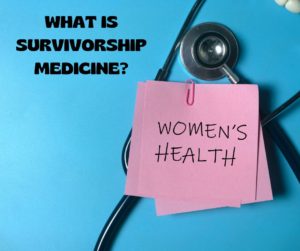
Women are living longer with better health and vitality. We are living decades into postmenopause, but our health concerns change over time. The current healthcare system needs an update to reflect a broader canvas of care as we age. In many cases, a primary care doctor is not enough and a team of specialists may be needed. Clinicians specializing in survivorship medicine reflect such a team.
What does survivorship in medicine mean? For many patients, it means surviving a cancer diagnosis but for others, it may mean surviving heart attacks, hypertension, arthritis, asthma or inflammatory bowel diseases. As we live longer, chronic conditions are often a part of our overall health care and more than one doctor may be involved in our treatment. As midlife women age, often times they will develop about 2-5 new diagnoses. From hypertension to high cholesterol, it’s important for women to find the right clinician and health plan that works for them. Through survivorship medicine, doctors strive to offer individualized care for a person’s specific needs, hoping to prevent illnesses from worsening or recurring through treatment plans.
Dr. Michael Krychman is a clinical health professor at the University of California Irvine, where he maintains a clinical practice of complex gynecology at the Ann’s Center, a High Risk Breast and Ovarian cancer center. He specializes in cancer survivorship, vulvar disease, and comprehensive care those with chronic disease and focuses on quality-of-life concerns. Dr. Krychman explains that the primary drive behind survivorship medicine is the prevention of disease progression and optimization of health when dealing with chronic conditions. Having a supportive team of doctors by your side can be crucial in creating your treatment plan, but for many women, they have no idea where to find the right clinicians. He suggests that it’s vital that women become their own advocate when searching for a healthcare team. He urges women to be okay firing a clinician and finding another if you feel you’re not being given proper care.
On average, a clinician will interrupt a female patient 11 seconds after she starts speaking, making her feel silenced and invalidated. It’s important to find a clinician that not only listens to you but hears you when you describe your struggles so they can offer the best care. You should also ensure that your doctors are communicating with each other. When dealing with multiple diagnoses, one doctor may prescribe a medicine without realizing it counteracts with another given by a different doctor. Keeping everyone on the same page and aware will help ensure you are receiving the most optimal treatment and taking care of your health.
Dr. Krychman also focuses his practice on complex gynecology. In this area, doctors study the complexities of women and how their bodies change and are affected by diseases (for example, cancer or endometriosis). When treating patients, these clinicians will look at a range of factors for disease prevention, including medication, environment, and stress levels. Stress deeply affects the body, and for menopausal women, can greatly influence sleep patterns. Menopausal women often do not have trouble falling asleep but rather staying asleep, and with added stress, they’re less likely to get the rest they need.
Another issue menopausal women face is the choice of whether or not to start HRTs. Many women are hesitant to do so due to breast cancer risks, and Dr. Krychman suggests that before starting any kind of treatment, it’s important to look at overall risk factors. For example, if people have active breast cancer, they should not be on systemic hormones. There are affective alternative forms of treatment, such as acupuncture and supplements. However, as every body is different, you have to look at each case with an individual lens. It is also crucial to get a medical opinion.
The same kind of individual attention should also be given to vaginal healthcare. While many people believe vaginal health only pertains to intimacy and sexuality, it actually encompasses a wide set of issues, including vaginal wellness and comfort. Women with breast cancer often suffer from vaginal awareness syndrome, which involves severe pain in the vagina that makes daily functioning more difficult. Through vaginal healthcare, they are given moisturizers and other alternative forms of treatment to help manage their symptoms.
With doctor’s appointments often only lasting about fifteen minutes at a time, it can be difficult to convey all of your concerns to your clinician in one meeting. For tips on how to better advocate for yourself during a healthcare visit, Dr. Krychman recommends choosing three issues you want to closely address before arriving to the appointment. That way, when the doctor enters, you can immediately tell them the top problems you want them to help with, rather than wasting minutes at the session itself trying to decide. Outside of doctor’s appointments, there are also other sources women can use to receive information on health and wellness. Dr Krychman lists:
- North American Menopause Society,
- American Association of Sexuality Educators, Counselors, and Therapists, and
- the American College of Obstetricians and Gynecologists all have websites with great resources.
We need to be our own best advocates. Women need to educate, research and share with our community but most of all, we need to remove the fear of having the difficult conversations with our clinicians. Make them aware of the symptoms that you struggle with and the medications that you are taking. As Dr. Krychman shares, the three most important words that a doctor can say are “Tell Me More.” If your doctors minimizes your concerns, search for a doctor who will listen. Your health depends on it.